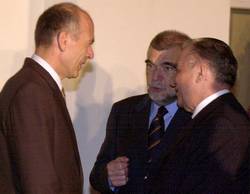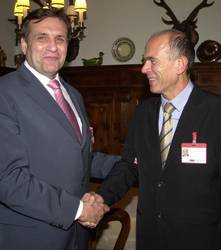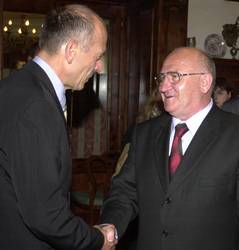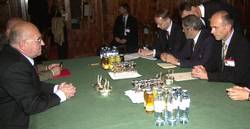 Office of the President of the Republic > Press centre
Office of the President of the Republic > Press centre
President Drnovšek Concludes His Participation At The Meeting Of Central European Presidents
Salzburg, 05/23/2003 | press release
The President of the Republic of Slovenia, Dr Janez Drnovšek, today participated in a working meeting of Central European presidents and directors of larger companies, bringing his involvement at the 10th Meeting of the Presidents of Central European States in Salzburg to a close. The meeting was spent discussing the opportunities and risks that the countries, and companies, in the region may encounter with the forthcoming EU enlargement. The participants in the discussion agreed that with the integration of the new Member States into the internal EU market, the establishment of new economic barriers for the countries outside the expanded EU's borders should not be permitted. They also agreed on the usefulness of such an exchange of opinions between heads of state and leading economists in the future.
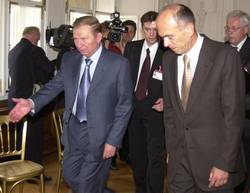 President Drnovšek also met today with the presidents of the Ukraine and Albania. The Ukrainian President, Leonid Kuchma, stressed the friendly relations between Slovenia and his country and their great importance to Ukraine, as the latter would like to rely on the further support of Slovenia and its assistance in Ukraine’s endeavours to join the EU. He also emphasised that trade between the two countries was increasing and thus represented a good basis for the further expansion of mutual relations. The Slovene President agreed with his assessment of the importance of Slovene-Ukrainian relations and informed his counterpart about Slovenia’s plans to gradually establish the Slovene Embassy in Kiev. He went on to say that Slovenia welcomed Ukrainian endeavours for its integration into Euro-Atlantic structures, and offered the benefit of its experience. He also stated that the forthcoming membership of some Slavic states in the EU imposed a need for the preservation of cultural values, traditions and interests that unite the countries using Slavic languages . In this context, Dr Drnovšek presented the Slovene initiative to establish a forum for Slavic cultures in Ljubljana, which received the support of the Ukrainian president.
President Drnovšek also met today with the presidents of the Ukraine and Albania. The Ukrainian President, Leonid Kuchma, stressed the friendly relations between Slovenia and his country and their great importance to Ukraine, as the latter would like to rely on the further support of Slovenia and its assistance in Ukraine’s endeavours to join the EU. He also emphasised that trade between the two countries was increasing and thus represented a good basis for the further expansion of mutual relations. The Slovene President agreed with his assessment of the importance of Slovene-Ukrainian relations and informed his counterpart about Slovenia’s plans to gradually establish the Slovene Embassy in Kiev. He went on to say that Slovenia welcomed Ukrainian endeavours for its integration into Euro-Atlantic structures, and offered the benefit of its experience. He also stated that the forthcoming membership of some Slavic states in the EU imposed a need for the preservation of cultural values, traditions and interests that unite the countries using Slavic languages . In this context, Dr Drnovšek presented the Slovene initiative to establish a forum for Slavic cultures in Ljubljana, which received the support of the Ukrainian president.
The Slovene President also met with the President of Albania, Alfred Moisiu. During their meeting, the latter emphasised the positive relations between the countries. Within this context, Mr Moisiu stressed that Albania still appreciated the friendly disposition of the Slovene nation and of Slovenia towards Albanians and their situation in the last decade. He also believed that this mutual understanding could be strongly enhanced by the opening of the Slovene Embassy in Tirana, something the Albanian side had been aspiring to for quite some time. Dr Drnovšek expressed his satisfaction with the meeting and assured President Moisiu of Slovenia’s continuous and active follow-up of the situation in the region after its accession to the EU. He added that he was certain Slovene-Albanian relations could be further deepened through a mutual exchange of visits on the level of heads of state.
